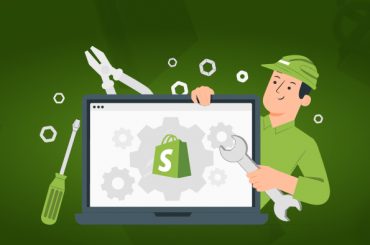Transitioning to Excellence: A Comprehensive Guide on Zen Cart to Shopify Migration
Last Updated | January 8, 2024
Table of Contents
Brief Overview of Zen Cart and Shopify
When it comes to creating an online store, choosing the right platform is crucial for the success of your business. There are many different e-commerce platforms available today but two popular ones that businesses tend to choose are Zen Cart and Shopify. Both of these platforms have their benefits and drawbacks, so it’s important to do your research and choose the one that suits your business’s needs best. In this blog post, we’ll be taking a brief overview of Zen Cart and Shopify, comparing and contrasting both of them.
What is Zen Cart and how does it work
Zen Cart is an open-source e-commerce platform that has been around since the early 2000s. It is known for its flexibility and customization options. Zen Cart offers a wide range of features including multiple language support, payment gateway integration, shipping integration, product and inventory management, and more. The platform has a user-friendly interface that is easy to navigate, especially for those with coding experience. One of the biggest advantages of Zen Cart is its open-source nature, which means that it’s free to download and can be customized by anyone with coding experience. However, the downside is that if you don’t have any coding knowledge, customization can be challenging. Overall, Zen Cart is an excellent e-commerce platform for small businesses with a limited budget, looking to have complete control over their online store.
Read Also Shopify To Shopify Migration
What is Shopify and how does it work
Shopify is a hosted e-commerce platform that is easy to set up and use without any coding experience. It offers customizable templates and a variety of features such as payment gateway integration, inventory management, and shipping integration, and also comes with a mobile app for on-the-go management. Shopify is designed to be an all-in-one platform, with the aim of offering an efficient solution for anyone who wants to set up an online store without the need for technical knowledge. One of the biggest advantages of Shopify is its integrations with various third-party platforms such as Amazon, Facebook, and Instagram, making it easy to sell products across multiple channels. However, the downside is that Shopify can be expensive, especially for businesses that need more advanced features.
Drive growth and multiply conversions! Partner with us for your custom Shopify app development needs.
Both Zen Cart and Shopify are excellent e-commerce platforms, but they cater to different types of businesses. Zen Cart is ideal for small businesses that have limited budgets and want complete control over their online store, while Shopify is suitable for businesses looking for an all-in-one solution that is easy to set up and use, without the need for technical knowledge. The key is to determine which features are important to your business and to choose the platform that best meets your needs.
Read Also Migrating from Webflow to Shopify
Zen Cart to Shopify Migration – Top Reasons
For years, Zen Cart has been a reliable eCommerce platform for businesses of all sizes. Its users attest to its cost-effectiveness, efficiency, and flexibility. But in recent years, Shopify has emerged as a leading eCommerce platform, with a host of new features and benefits that have made it a popular choice for online retailers. If you’re currently using Zen Cart and considering a migration to Shopify, then you’re in the right place.
Shopify is User-Friendly
One of the most significant benefits of Shopify is its user-friendly interface. Compared to Zen Cart, Shopify is much easier to use and navigate. Its drag-and-drop interface makes setting up your online store a breeze, even for those with little to no technical expertise. You don’t need any programming knowledge to get started with Shopify, which means you can focus on running your business rather than worrying about your website’s technical aspects.
Shopify has superior security
Security is a top concern for every eCommerce business owner, and Shopify takes that security very seriously. Shopify has a team of security experts constantly monitoring their platform for potential vulnerabilities and breaches. They also provide 24/7 support to help you with any security concerns you may have. With Shopify, you can rest easy, knowing that you’re using a safe and secure eCommerce platform for your business.
Shopify offers Many Integrations
Shopify has a wide range of integrations that allow you to connect with various applications, such as accounting, shipping, and marketing tools. This flexibility means you can easily streamline your business operations and use the applications that work best for you. Zen Cart doesn’t offer this level of flexibility, which can make it challenging for online retailers to scale their businesses.
Shopify has excellent themes and templates
One of the most significant benefits of using Shopify is access to its extensive collection of themes and templates. Whether you’re starting with a new website or redesigning an existing one, Shopify offers a wide range of stunning themes that you can customize to fit your brand. The themes are not only beautiful and modern but are also mobile-friendly, so your customers can shop from their phones or tablets with ease. Zen Cart, on the other hand, doesn’t offer a visible range of templates and themes, which can limit your website’s visual appeal.
Read Also Square to Shopify Migration
Shopify has better customer support
Shopify is renowned for its excellent customer support team. From live chat to phone and email support, the Shopify support team is always on hand to answer any questions or concerns you may have. The support team is professional, knowledgeable, and always ready to help you with any issues that may arise. Zen Cart, on the other hand, doesn’t offer live chat or phone support, which can be frustrating if you need quick help with your eCommerce store.
Migrating from Zen Cart to Shopify is a wise decision that could significantly benefit your eCommerce business. With its user-friendly interface, superior security, many integrations, excellent themes and templates, and better customer support, Shopify is the ideal eCommerce platform for businesses of all sizes. If you’re ready to take your online business to the next level, consider migrating from Zen Cart to Shopify today.
Pre-Migration Preparations from Zen Cart to Shopify Migration
One of the steps that are crucial in the success of a Zen Cart to Shopify migration process is pre-migration preparation. You may want to consider backups and various other aspects to ensure a hassle-free migration process. Thus, knowing the pre-migration preparations to make before migrating your Zen Cart store to Shopify will aid in the seamless migration of your store.
Backups
Before you start migrating your Zen Cart store to Shopify, it is crucial to create a backup of your data. A backup helps to ensure that your data is protected during the migration process. With a backup, you can easily restore your data in case anything goes wrong during or after the migration process.
Data Cleanup
Data cleanup is essential in the pre-migration process. You need to ensure that your data is accurate and up-to-date. Consider removing duplicates and outdated entries. Doing this beforehand will ensure that your data is error-free and accurate when you eventually migrate it to Shopify.
Read Also Etsy To Shopify Migration
Selecting the Right Shopify Plan
Selecting the right Shopify plan is crucial to ensure a successful migration. Ensure that you choose the right plan that meets your specific needs, and you’ll have to factor in your store’s size, types of products and customers, and the level of customization you need. You can consult Shopify support for assistance in selecting the right plan to help you make an informed decision.
Theme and Design
Your Zen Cart store may have had a certain look and feel. You can replicate or upgrade its design on Shopify by choosing a theme. Shopify offers a variety of themes that cater to various store types or niches. You can select a theme that aligns with your brand’s image or update your previous theme to offer a more streamlined and iterative design.
Notification and Communication with Customers
Migrating your store to Shopify impacts your customers, and you must communicate the changes to your clients before and during the migration. Notify them about the changes in price and order processing time, especially concerning shipping and delivery. You can also inform your customers of the new features and benefits that come with Shopify such as improved site speed and mobile responsiveness.
Read Also How to migrate OpenCart to Shopify
Migrating your Zen Cart store to Shopify is a crucial process, and proper preparation beforehand can make the process easy and straightforward. Creating backups, cleaning data, choosing the right plan, selecting the theme and design, and communicating with customers are critical pre-migration preparations. With these tips, you can be sure of a smooth, hassle-free Zen Cart to Shopify migration.
The Ultimate Guide to Design and Customization on Shopify after Zen Cart to Shopify Migration
As a business owner, it’s important to keep your online store up-to-date and visually appealing. If you’ve recently migrated from Zen Cart to Shopify, you may be wondering how you can customize your Shopify store and improve its design.
In this guide, we’ll explore the various design and customization features available on Shopify, and how you can use them to create a beautiful and unique storefront for your customers.
Choosing a Shopify Theme
After migrating from Zen Cart, the first step is to choose a Shopify theme that suits your brand and products. Shopify offers many customizable themes that provide a strong foundation for your store while giving you the flexibility to customize. You can choose from free themes or premium themes to find a design that suits your requirements. Once you have a theme downloaded, you can customize it to your liking by editing the code or using the theme’s customization options to control the layout, fonts, colors, and more.
Customizing Your Theme
After choosing a theme, you can customize it to create a personalized storefront. With Shopify’s theme customization tools, you can change your store’s visual elements, including font, colors, header, footer, cart, and more. You can add custom images, videos, slideshows, and banners to highlight your products and promotions. Customization options also include widgets and apps that can enhance the user experience, improve functionality, and add more features to your store.
Read Also Migrate From Volusion To Shopify
App Integration and Extensions
Shopify offers a rich ecosystem of apps and tools that can help you take your store to the next level. You can use apps to customize your email templates, create popups or upsell widgets, add social media sharing, bulk edit your products, and more. Many apps offer free trials or have a freemium model, while others have a one-time or recurring fee. Before choosing an app, be sure to read reviews and do your research to find the best solution for your needs.
Advanced Customization Options
As your business grows, you may need advanced customization options that give you greater control over your store’s design and functionality. Shopify provides several advanced customization tools that allow you to customize your store at a deeper level, including Shopify Liquid, CSS, and HTML. These tools are best suited for Shopify developers or Specialized Shopify designers with coding skills and can be used to fine-tune your store’s design to meet your needs.
Hiring a Shopify Expert
If you feel overwhelmed with the customization process or don’t have the time and knowledge to make changes to your storefront, you can consider hiring a Shopify expert. A Shopify expert is a certified professional who has experience in designing and customizing Shopify stores. They can help you create a unique store design, install apps, and make the necessary changes to your theme or code. Shopify offers a directory of experts that you can browse to find the best match.
Migrating from Zen Cart to Shopify is a smart move for your business. With Shopify’s robust design and customization features, you can create a beautiful and unique storefront that attracts customers and drives sales. Whether you choose to customize your theme or use advanced tools, there are plenty of options to help you achieve your desired store design. Remember that design plays a crucial role in your online store’s success, so take the time to create a visually compelling storefront that reflects your brand. Happy designing!
Achieving a Seamless Transition: Testing Your New Shopify Store after Zen Cart to Shopify Migration
Congratulations on successfully migrating your eCommerce store from Zen Cart to Shopify! It’s a smart move, and it’s something that can benefit you and your business in the long run. However, don’t rest on your laurels just yet. Before launching your new Shopify store, testing should be done to ensure everything is set up correctly and working smoothly.
Testing can be a little bit daunting, especially if you’re not familiar with the process. However, the effort will pay off, especially if you’re looking to avoid any potential issues that can compromise the user experience of your customers.
Check your Product Information:
After migrating your data, double-check if all your product information was transferred successfully. Take a look at your product titles, descriptions, images, prices, and more. Ensure that all the necessary information is complete and accurate. Test your navigation menus and ensure that your products are appearing correctly on all relevant pages. This step is crucial in maintaining your sales and customer satisfaction.
Evaluate your Payment Processing:
After setting up your payment gateway, it’s vital to ensure that it’s running smoothly. Test placing orders and make sure that your payment processing and confirmation emails are correctly set up. No customer wants to encounter payment issues when they’re already in the purchasing process.
Test Your Store’s Search Bar:
Testing your site search is essential—this is what enables your customers to find what they want to buy. Search for specific products and check if the relevant pages are displayed, ensuring that your store’s search function is in top condition.
Check Your Site’s Speed:
Loading speeds are critical when it comes to retaining customers in your online store. Test your website’s speed, and make sure your store is running smoothly and fast. A limited loading time makes your customers happier and prevents their desire to abandon their purchases from prolonged load times.
Check your Mobile Responsiveness:
Over 60% of digital users view websites on their smartphones. Make sure your site is mobile-responsive, ensuring that your site’s layout, texts, and images are optimally presented on mobile devices. Test navigation on both desktop and mobile versions, and make sure your site looks professional on all devices.
Testing should be a crucial part of your eCommerce migration SEO checklist. It’s not enough just to migrate your store and rely on the assumption that everything will be working smoothly. Testing after Zen Cart to Shopify migration will benefit your business in several ways, such as ensuring the best possible user experience, and maintaining your sales revenue, Google ranking, and happy customers. By testing your site, you’re giving both peace of mind to yourself and customers with a better shopping experience. The process may be time-consuming, but it’s a necessary step to take. With this in mind, don’t hesitate to test your online store rigorously before relaunching it.
A Complete Guide to SEO and Redirect Setup for Zen Cart to Shopify Migration
Migrating your online store from Zen Cart to Shopify can be a daunting task. But with a seamless transition, you can take advantage of all the benefits that Shopify offers. While Zen Cart is a popular open-source eCommerce platform that has served retailers for years, its outdated technology and limitations will hinder your business growth. In contrast, Shopify is a modern, feature-rich, and easy-to-use eCommerce platform that comes with powerful SEO tools.
Understand Your Current Zen Cart URL structure
Before you start migrating your online store to Shopify, analyze your current Zen Cart website and understand the URL structure. This will help you determine which URLs to redirect to Shopify to maintain your SEO ranking. The product URLs from Zen Cart must be redirected to the corresponding Shopify URLs so that your customers can find the same products on the new platform. Use tools like Google Analytics and Google Search Console to help you understand your current SEO rankings and traffic sources.
Map Your Old URLs to New Shopify URLs
After analyzing your Zen Cart website’s URL structure, create a map of your old URLs and new Shopify URLs. Shopify offers a redirect feature that allows you to redirect your old URLs to the corresponding new URLs. Shopify uses a specific URL path scheme based on a URL structure composed of /collections/product-type/product-name. This process can be time-consuming, so you can hire an expert Shopify developer to help you.
301 Redirects
Redirecting your old Zen Cart URLs to the new Shopify URLs is crucial to maintaining your SEO ranking. When you move your store to a new platform, the URLs will change, and this can impact your SEO rankings. Shopify uses 301 redirect which is a permanent redirect and carries over your SEO value from the old URL to the new URL. The 301 redirect tells Google and other search engines that a page on your site has permanently moved to a new location.
Create Custom 404 Pages
It’s essential to create a custom 404 page for your Shopify store. A 404 page is the page that appears when a user tries to reach a page that doesn’t exist on your site. The custom 404 page will display when a user lands on a missing page, and it should include helpful information that directs the user to another page on your site. Try to make your 404 page more engaging and informative so that your customers don’t get frustrated and abandon cart your site.
Optimize Your Shopify Store for SEO
Now that you’ve successfully migrated your Zen Cart online store to Shopify and set up the necessary redirects, it’s time to optimize your Shopify store for SEO. Shopify has built-in SEO features that help you optimize your store for Google and other search engines. These features include Title Tag, Meta description, Header tags, Image alt tags, and URL optimization. Make sure that all your product pages have descriptive meta titles, descriptions, and header tags that include your keywords.
Zen Cart to Shopify migration can be an intimidating task, but it’s an essential step in your eCommerce business growth. The above guide will help you create a seamless and successful transition from Zen Cart to Shopify while maintaining your SEO ranking. Don’t forget that SEO is critical to your online store’s success, and you must optimize your Shopify store for search engines. With Shopify’s SEO features and the right redirects, you’ll attract more customers, improve your search engine ranking, and ultimately grow your business.
Post-Migration Considerations for Zen Cart to Shopify Migration
In today’s digital landscape, your business’s online presence is critical in reaching and engaging potential and existing customers. With multiple eCommerce platforms available, online retailers have numerous options to choose from. However, not all eCommerce platforms are created equal. Shopify is a popular platform that offers advanced features and improved functionality to take your business to the next level.
For online retailers, moving from Zen Cart to Shopify can be a daunting process. The migration process could require a lot of resources and time for completion. However, once the migration is complete, you need to focus on post-migration activities to ensure everything works as intended.
Data Verification:
Once you complete the data migration process, you need to verify that the data migrated correctly. We recommend verifying the migration of products, orders, customers, and payment methods data. Ensure that there are no incomplete sequences or data inconsistencies. Shopify migration experts recommend that the verification process be completed twice.
SEO Considerations:
Online businesses rely heavily on search engines for website traffic. In your post-migration, ensure that your website’s SEO elements such as meta descriptions, keywords, and URL structures are optimized correctly for Shopify. Create and validate your Shopify sitemap in Google Search Console for search engines to crawl your site efficiently.
Theme Customization:
Your website’s theme reflects your business identity and plays a critical role in user experience. Shopify offers customizable themes, including free and paid themes. You are limited only by your imagination when it comes to customizing your Shopify website, from color schemes, background images, and typography to layout and functionality. Ensure that your website’s theme is designed and customized consistently according to your brand message.
Payment Gateway Configuration:
Shopify supports various payment gateway integrations, including Pay by Phone, PayPal, Amazon Pay, and Stripe. Configure your chosen payment gateways correctly to ensure that customers can complete their purchases successfully without any challenges. Check your payment gateway’s configuration regularly to ensure that it remains updated with the latest features and payment standards.
Training and Maintenance:
Shopify offers comprehensive tutorials and documentation meant to help you understand its functionality in-depth. However, you or your team may require Shopify training, especially if you are new to the platform. After training, ensure that they can manage the website and make changes without any external assistance. Schedule regular website design, content, and functionality audits to keep your website updated and functioning optimally.
Migrating to Shopify from Zen Cart requires strategic planning and execution. It can be an intimidating process if not adequately executed. The post-migration considerations listed in this blog, such as data verification, SEO considerations, theme customizations, payment gateway configurations, and regular maintenance, are steps you cannot overlook. Shopify significantly streamlines the online sales process and provides a host of advanced features that can enhance your online retail business’s capabilities. Therefore, consider migrating to Shopify to improve your online sales process and take your eCommerce business to the next level.
FAQs – Zen Cart to Shopify Migration:
What technical skills are needed to successfully migrate?
In today’s fast-paced digital age, businesses need to be adaptable and able to switch platforms seamlessly. This is where Zen Cart to Shopify migration comes in. However, it is not something that can be done without the right technical skills. Migrating data from Zen Cart to Shopify requires expertise in HTML, CSS, and JavaScript. It is essential to have a good understanding of these technical skills to ensure that the migration process is smooth and successful. With Shopify, businesses can benefit from a user-friendly platform that offers features such as customizable templates, mobile optimization, and built-in SEO tools. Therefore, it’s important to have the right skill set to ensure that the migration is seamless and that all the data is transferred smoothly.
What support services are available during the migration process?
Are you planning to migrate your e-commerce store from Zen Cart to Shopify? No need to worry, as there are a plethora of support services available to help you make a smooth transition. From data migration to responsive design, experts in this area offer a range of services to make the shift to Shopify an easy one. It can be quite daunting to undertake something as complex as migrating your online store, but with the help of professionals, the process can be simplified. With Shopify’s user-friendly platform and a team specializing in Zen Cart to Shopify migration, you can rest assured that your store will be up and running in no time!
What are some of the challenges that arise during the migration process?
The migration process from Zen Cart to Shopify can be a challenging one, with various obstacles that businesses are likely to face. As Zen Cart and Shopify are two distinct platforms with different coding structures, it’s common for data to be lost or altered during the migration process. Additionally, there are differences in the features and functionalities of both platforms, which can take some time to acclimate to. However, with careful planning and expert guidance, these challenges can be surmounted, ensuring a seamless and successful migration process. Ultimately, the benefits of migrating from Zen Cart to Shopify can far outweigh the challenges, providing businesses with a powerful, versatile, and user-friendly platform to help them achieve their goals.
Conclusion:
In conclusion, the transition from Zen Cart to Shopify is a detailed but extremely helpful process for those who want to upgrade their eCommerce sites. To successfully complete your transition to excellence, it is necessary to be prepared ahead of time and understand exactly how this move will affect you long term. With the right resources and guidance, such as our comprehensive guide on Zen Cart to Shopify Migration, you can make the switch with ease and efficiency. With the combination of our comprehensive guide and a few tips from experts in migrating online stores, you should now have all of the tools that you need for success. Ready to start building up your store? Then take action! Now is the perfect time to make your transition into excellence with the smooth migration process of Zen Cart to Shopify.









